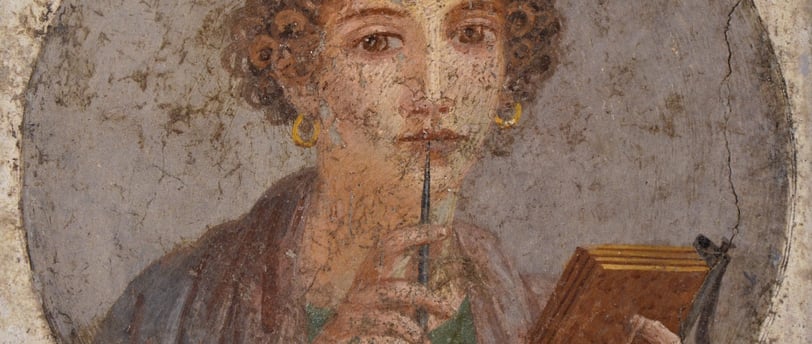Sappho: The Great Poetess
Georgia Kiosi
1/20/20252 min read


μνάσασθαί τινά φαιμι
καὶ ἄψερον ἀμμέων
Someone will remember us, I say
Even in another time.
147 Lobel - Page
In the times when Nebuchadnezzar II was plundering Jerusalem, Solon was governing Athens, Phoenician seafarers were exploring the African continent for the first time, and Anaximander was contemplating the origin of all things, Sappho crafted her poetry. Her name, believed to have a Hittite origin, means either “numinous,” “clean,” or “pure source,” or it is a corruption of the ancient Greek word for sapphire and lapis lazuli.
Sappho (c. 630–570 BCE), was one of the greatest lyric poets of ancient Greece, she crafted poetry that lasted across millennia. Sappho lived in the city of Mytiline on the island of Lesbos. She was a musician and a poet and she appears to have devoted her life to composing songs. She was known variously as “the tenth muse” and “the female Homer”. Hellenistic poets called her “the mortal Muse”. Unlike epic poets such as Homer, Sappho wrote lyric poetry, intended to be accompanied by lyre. Her works focus on themes of love, desire, and beauty, emotion, devotion and longing, vulnerability, sorrow and heartbreak.
Fresco showing a woman holding writing implements, a wax tablet and stylus. Commonly called Sappho, the fresco actually portrays a high-society Pompeian woman, richly dressed with gold-threaded hair and large gold earrings. From Pompeii, ca. 50 CE. (Naples National Archaeological Museum)
ὄπταις ἄμμε
You set me on fire.
19 Lobel - Page
Ἔρος δ᾽ ἐτίναξέ μοι
φρένας, ὠς ἄνεμος κὰτ ὄρος δρύσιν ἐμπέτων.
Love shook my breast
As a wind in the mountains assaults an oak.
47 Lobel - Page
φαίνεταί μοι κῆνος ἴσος θέοισιν ἔμμεν᾽ ὤνηρ
He seems to me equal to gods.
In just a handful of lines, Sappho speaks directly to the human heart. Her verses, intensely personal, reflect her inner world and relationships. The intimacy of her verses renders her unique among ancient poets, offering rare insight into the private lives and emotional experiences of women in antiquity, as she is the first surviving female author in the Western tradition.
“
”
In one of her poems, Sappho wrote:
Further reading
Carson, Anne. “If not, Winter: Fragments of Sappho”, Vigaro Press, 2003.
Center for Hellenic Studies. Selections from Sappho. Harvard University, https://chs.harvard.edu/primary-source/sappho-sb/. Accessed 19 Jan. 2025.
Higgins, Charlotte. "Sappho: the Poet Who Transcends Time." The Guardian, 11 Jan. 2010, https://www.theguardian.com/culture/charlottehigginsblog/2010/jan/11/sappho-poetry-classics. Accessed 19 Jan. 2025.
Schalansky, Judith. "What We Know of Sappho." The Paris Review, 8 Dec. 2020, https://www.theparisreview.org/blog/2020/12/08/what-we-know-of-sappho/. Accessed 19 Jan. 2025.
Wilson, Emily. “Lady of Lesbos.” The Guardian, 2 Feb. 2004, https://www.theguardian.com/books/2004/feb/02/classics. Accessed 19 Jan. 2025.
